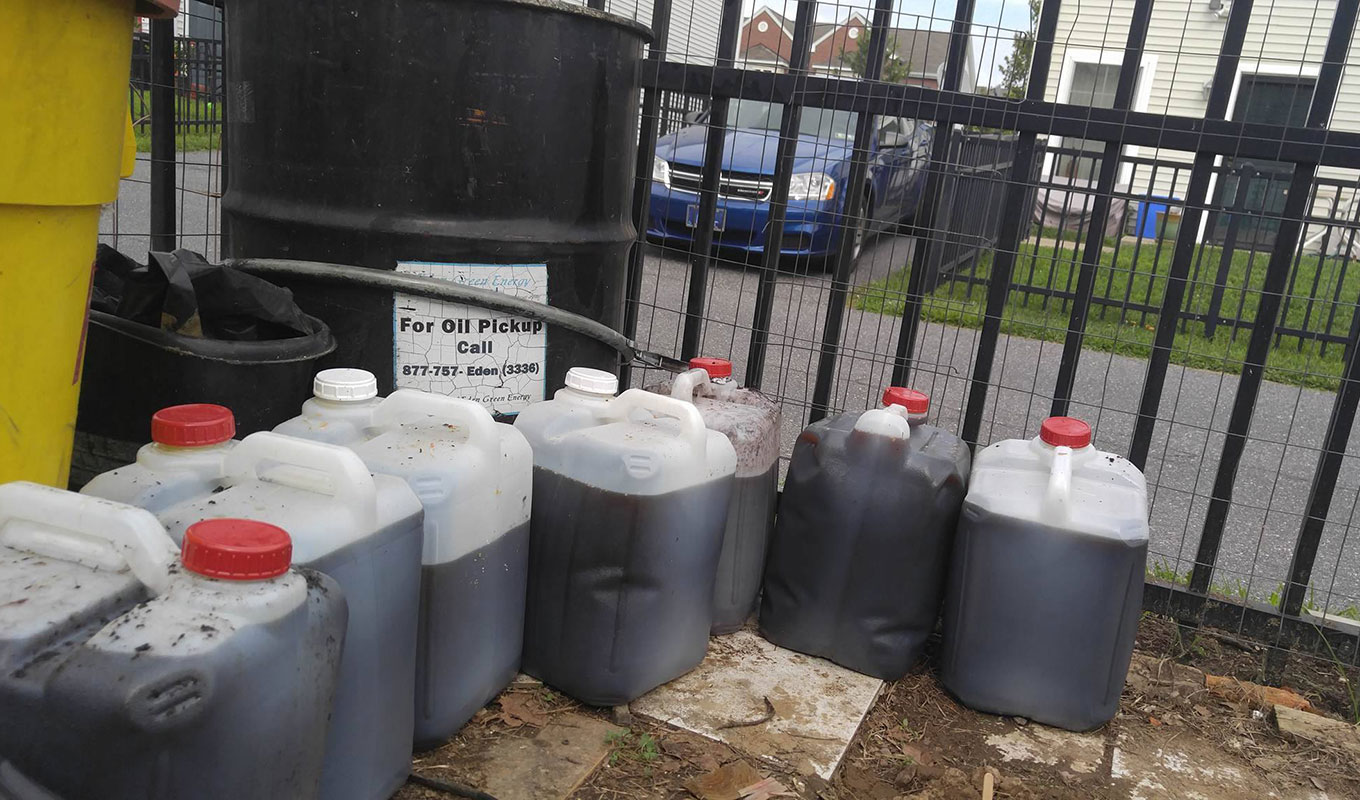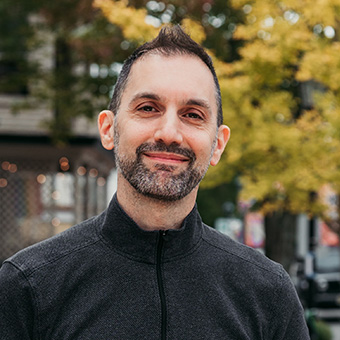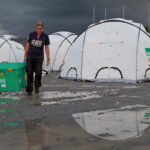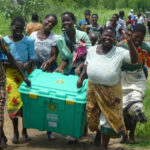
Feed the Barrel
Podcast: Play in new window | Download
Hani White’s mother and grandmother made sure that cooking was a family event as she grew up near Jakarta, the capital city of Indonesia. For them, cooking was a shared experience that strengthened family and community bonds. And in her part of the country, a great deal of that cooking involved readily available vegetable oils. Disposing that used oil was as simple as throwing it into a local trash pit. After immigrating to the US, Hani continued those same cooking traditions – but trying to dump her used cooking oils was much more complicated in the middle of a bustling city. With help from her neighbors, Hani has found a better way to repurpose the oils, helping the environment and bringing her community together in the process.
LINKS:
Full Transcript
Chris Straigis – 0:01
From AAC Studios, welcome to Scrappy, the podcast about small companies doing big things. I’m your host, Chris Straigis. Today we talk with Hani White, co-founder of Feed the Barrel, an organization in Philadelphia that collects used cooking oil to repurpose it into useful products like soap and biofuel, and keeps it out of landfills and water treatment facilities where it can create big environmental problems.
Hani White – 0:31
How about we do this for our kids? How about we do this for our next generation. This is a great opportunity to bring our community together to teach our kids about how they could contribute to American society. And at the same time, we’re going to make their Earth better.
Chris Straigis – 1:01
One of the most communal activities shared by our human cultures around the world is the experience of food – spending time cooking and eating with friends and family. Hani White is taking this shared experience to another level by coordinating her community around one specific aspect of food, or rather, a food preparation byproduct – used cooking oil. Feed the Barrel is a cooking oil recycling program that was started by Hani and some friends from her Indonesian neighborhood in South Philadelphia. They’re not only helping people avoid costly plumbing disasters, but they’re helping to protect the environment, creating new useful products from waste and, in the process, demonstrating how one small action can change a big city for the better. Feed the Barrel’s roots formed at the crossroads of cultures from two different sides of the globe.
Hani White – 1:56
When I was a kid, I ate anything and everything. I remember my mom say that like if there is an elephant in the room you going to eat those elephant, right? I am not a picky eater. I eat anything, but we ate a lot of vegetables. The thing is like my grandma grew a lot of vegetables, and meat, fish tend to be more expensive. So I remember that my mom usually purchased some meats but not a lot. She got it really small to share it with everyone but there is always either meat or fish or chicken. But the main thing is vegetables. I could not quite remember where when my mom never cooked. She cook sometime two times a day. And it’s always like, a family affair, right? She always took me to the market. She always took me in the kitchen. And another plus is my grandma, she grow her own food. So we have this full cycle right when my grandmother that lives with us have a garden in the side of the house that growing our own food, and then my mom go to market to buy the meat or the chicken or the fish, and we just combining it. It just so amazing that it’s such a playground for us. Cooking it’s become like a daily part of our lives.
Chris Straigis – 3:36
Growing up in Indonesia, Hani says that vegetables were a very common and very large portion of the meals. But how those vegetables were prepared depended largely on where in Indonesia you were.
Hani White – 3:48
Absolutely, lots of vegetable. The reason is, like I say it’s a very tropical country. Anything that we put underground it will grow like without even we taking care of. So it’s easy to have like multiple different type of vegetable. But the method of cooking itself is really different. Indonesia have 17,000 Island. So it’s really depend on where you live. If you live closer to the mountain, of course you ate a lot of vegetable and you steam it, but where I’m from as like, I’m in the capital city, and we not too close to the mountain and we not too close to the ocean. So we ate basically everything and the method of cooking, a lot of steaming, a lot of frying, and a lot of deep fried also, somehow, anything that we could think of, like there is always component of frying, either is for breakfast, lunch or dinner. Like you always have your steamed rice on the side. It might be like fried chicken or fried egg or fried beef. With the vegetable, the soup is always… like even the rice, if let’s say the rice from the previous day we not finishing up, the next day we fried it become a fried rice and that’s become our breakfast. And it’s always like frying with cooking oil.
Hani White – 5:23
Another reason why cooking we cook with a lot of oil because it’s easily available. We have a lot of palm oil production in Indonesia. And we do have a lot of coconut oil also. So it’s really depend on what kind of food like we could have like multiple different type of oil that we could use, and it’s easily available and it’s very affordable. And back then back home in Indonesia, because it’s tropical country, we always never really think like how to trash it, and there is no sophisticated trash system in Indonesia. We always have like in the backyard, we have like a big hole and we just dump our trash there. And then either we it’s become a compost, or we burned it. And it just as simple as that and we never think of it right? So my mom was like, “oh, the oil is too dirty,” she just trash it on the ground. And we don’t never without ever know that it’s could pollute the ground. It’s not part of our knowledge, I guess. And of course, as soon as you don’t see it in your house, you don’t think it’s your problems, goes to the water stream and it’s like it’s not, no longer our problem. It’s become like part of the part of the soil part of the land part of the whatever, but we never have that kind of education that is not good if you trash the oil just like that.
Chris Straigis – 7:02
in 1998, Hani immigrated to the United States with her family. But really her journey to America has started many years earlier when her father planted a seed in her head as a young child.
Hani White – 7:14
Since I was small, little kids, my father, he is, he adored United States as a country a lot. And as a few years old kids, I remember, he showed me like a beautiful book about United States, and he told me someday you’re going to be at this country. And he showing the picture of New York City, he showing the picture of Grand Canyon and multiple different parks, national parks in the United States. And I think my subconscious mind start working there.
Chris Straigis – 7:50
When she finally took the journey in the late 90s, Hani settled in South Philadelphia in a community of other Indonesian immigrants.
Hani White – 7:58
We are a smaller, very small community in South Philadelphia, the Indonesian community, really just that move it into Philadelphia after 1998. So we grow in community, and we start having, like, we start organizing ourselves. We say like we want to be successful immigrant community, we look at a different model with the Korean community, the Chinese community, the Vietnamese community, we start looking at those community that is like, oh my God, they are so advanced. They already have their own mall, they already have their own economic power, right? We want to do something that make a difference.
Chris Straigis – 8:41
Hani, like the rest of her community brought a love of her native foods with her to the States. They also brought the same methods of cooking, using various vegetable oils as a mainstay of the process. What Hani and her neighbors didn’t realize at the time, was just how different oil act when it runs through cold pipes here in the northeast us.
Hani White – 9:03
When we came to United States, we was thinking that like trashing the oil down the drain is not a big problem. That mentality because back home like I say it’s 90 degree, and we don’t basically computed here that it’s a different totally different climate, right? So we cook the same way, right, the way our mom cook. And when I moved to South Philadelphia, we knew that the infrastructure is really, really old, but we never really think it further than that. Just like oh, it’s an older pipe is an older type of home. And we just trash the oil the way our mom trash it back home, we pour it down the drain, right? Or sometime we just put it in a container and now we put it with our trash. There is no other, we do not know either way how to do it like, what is the better way? So then we start realizing that some people in different blocks have a clogged pipe. And, you know, as mothers, we talk about our house, and talking about our kids, right? And one day my two of my friends have a conversation at the school yard.
Hani White – 10:27
And we mentioned about like, here, my pipe is clogged and something happening, you know, and we have no clue what it is. And the other mother actually have their basement flooded. And what’s really funny is she worked for EPA. And she was like, wow, is not only my community problem, someone that work for EPA have the same problem. And we start having that conversation that like, Hey, I think I know the mother that work for EPA. She’s not saying that like I think I know what’s going on. And we like what’s going on, right? It’s like, did you put the oil down the drain and put the bacon grease, or like after Thanksgiving the turkey grease down the drain? And we like look at each other, we like you read our mind you read our, you know? And she was like, oh my god, it’s actually I was realizing that not only as problem as an immigrant, because the reason that we should be bring it up like I said she have a flooded basement and in South Philly, if we have flooded basement we never think it’s because of the clogged pipe because of the oil right? Imagine that you losing the entire basement. Right? Your stuff is down there. You need to pay router router. It could be hundreds, hundreds of dollars, and we not like economically, we not like middle upper income, we are middle lower income. So like $400, or $500, $600, that’s it’s like sometime it’s like half of your rent. And it’s happening from house to house. And we start seeing this as a as a community problem.
Chris Straigis – 12:21
The more Hani talked to her friends about the plumbing, the more they began to realize it was a much bigger and wider spread problem. And solving this one issue safely and conveniently disposing of used cooking oil could help bring their community together and create change not only for themselves, but future generations. It could be one step to help build that more advanced community that they dreamed of.
Hani White – 12:46
We want to have a better voice. And we start talking to different mom and dad. And we start seeing this as like possible project that we could carry on and bringing our community together, right tackling it together. And plus we have the incentive of this EPA mother that have like the same problem with us. And this EPA mother is like we we start having further conversation, and she’s like, maybe EPA could help us. And we start seeing this as an opportunity that like, if we call up, collaborate with good institution, legit institution, this is going to make our community better and stronger. And, of course, it’s solving the problem to. We could use this as a momentum, as a movement that can bring the community together, learning about the environmental and work with government federal institution.
Chris Straigis – 13:56
As Hani and the other mothers discuss possible options, they realize that their solution could not just center on a way of disposing of the cooking oil. The best way forward was not only to get rid of it, but to recycle it, which would have a positive environmental impact as well.
Hani White – 14:12
Originally, we like oh, the only thing that we know is trashing the oil down the drain or trashing the oil with the trash every week, right? And then EPA say that like, hey, do not trashing the oil with your trash, it’s actually going to end up in landfill. And when it’s end up in landfill, it’s going to create this methane gas that actually going to pollute the landfill also. And we look at each other like, we didn’t know that. So there is no other way. We trashing down the drain, it’s cost us money. We have this basement flooded, right? But if we trash it with our trash, it’s bad too because we pollute the landfill.
Hani White – 14:58
So we’ll look at each other like , oh my God. And the EPA say like, how about if we developed something that we collecting it? And that’s when the one of the head of the Indonesian Diaspora Network start thinking like, that’s right, collecting it, collecting on where people have a meeting together. Because he is a pastor, he know that, like, if we collecting it, we need to have masses of people that collecting this oil and going to bring the oil to somewhere other than their drain or their trash, right? And we stop, we start thinking that like, that’s right, every Sunday, we could collect the oil, right? And mothers could come to the church with their oil instead of just trashing down the drain. And EPA say like let’s we do research about it, how we could just collect it, and then maybe we could donate it to someone right?
Hani White – 16:01
Because there is a way to kind of like recycling something and we like wow there is a recycling of dirty cooking and we do not know. And then the next meeting the EPA coming out with like ideas that like, do you know there is a company in Philadelphia that actually willing to get your oil and help you to recycle? And we like, no we do not know. And we start doing the research together. We find a company that owned by another immigrant. And we like this is so perfect, we are immigrant here and there is a company that actually doing oil recycling, and he also immigrant. He’s from Italy. And he got the idea on recycling oil because in Europe they’ve been doing this for years – in Barcelona, in Italy, they have this concept for years in Germany, in UK and they just like it’s so new in United States.
Chris Straigis – 17:06
The Italian is Domenico Finocchiaro, who collects oil for Eden Green Energy, a vegetable oil recycling plant. Domenico’s organization already had an infrastructure to process the used oil. It was simply a matter of creating a new collection structure for Hani’s neighborhood.
Hani White – 17:24
And he said like, “you know what we could provide you with the barrel”, we like what barrel? And he started showing us picture of the barrel. “This is what we put in different restaurant. This is what we put in grocery store.” And was like, wow, we actually could have that in our churches. And he’s like, “sure,” and we’re like, “but our church don’t have money and looks like it’s expensive barrel.” He’s like ‘it’s okay, we could provide you with free barrel not the most expensive one, like we provide restaurant, but the basic one, at least you could hold the oil at the barrel and every two month, every three month whatever the barrelful, we could come and pick it up.”
Chris Straigis – 18:04
For the plan to take off. However, Hani would need more than the support of a few friends and an EPA Rep. She needed to get buy in from her entire community and have them agree to place a barrel for collecting oil right at their church.
Hani White – 18:18
We say like, Okay, I think we have the model. I think we know what to do. But we’re not going to move anywhere if there is no participation, right? And of course, the pastor say like, no problem. Let’s invite all the church, we just need to put like a community meetings and see what the community say. And we have the first community meeting, we invite all the Indonesian churches, we have the partner, which is the Italian guy and the EPA. Just beautiful, we show the pastors and the community the barrel, we give the presentation we say that like this is going to be a great thing. You don’t need to spend money anymore to like clean your clogged drain. And, and we get the buy-in. At first, like the church is kind of like hesitate. They’re like “do we really want to have barrel at our church? Like it might be smelling our church might be going to smell like a fried chicken.”
Hani White – 19:32
But then I remember there was one guy his, like, uh, he’s a community blogger, his name is Pat Bonoh, oh, I remember that. He just like, everybody like look at each other. They’re like, this is something great but we do not really know whether we want to have the barrel in our church right? And he just step up he said like, “friends family and pastors, let think about this. How about we do this for our kids, how about we do this for our next generation? This is the great opportunity to bring our community together to teach our kids about how they could contribute to American society. In the same time, we’re going to make their Earth better. And this is our time to make a difference.”
Hani White – 20:26
He just stepped up like that. Everybody just like us, right? We are newly immigrant that immigrated here. We want to contribute to the society. We want to contribute to our home South Philly, and we want to do this for our kids. And then we ask the question like, “which church that willing to host the barrel?” All hands up. We like this is too good to be true. And then that night seven church sign up to host the barrel.
Chris Straigis – 21:05
And from there, Feed the Barrel was officially off the ground. Hani estimates that since they started the program in 2014, they’ve collected over 3000 gallons of cooking oil. That’s 3000 gallons of oil that’s been saved from drains and landfills and repurposed into usable items.
Hani White – 21:24
He processed the oil to become biofuel, compost and soap. And he show us like this is how we separate the oil from the food, dirty food. And then after that, this is the clean oil and we turn it we put some chemical to it. We turn it to become biofuel and we sell it to the farmers in Lancaster or whatever area so they could run their tractors right? And the food that coming out from all this oil, they press it they make it really dry and there is a food scrap, right? And they turn it to become compost by putting red worms. And they show us like a cute little soaps. And we just stunned. We just like, this is so cool that actually things that we trash have a second life. And what really hit me because my mom, my grandma, did grow our own food. And my husband started growing our own food in our backyard. And we like now we can get a compost from you? And he said “feel free to come anytime.” We thought that we just tried to solve the problem so our drain not clog. We just don’t want to spend money. This is crazy. It’s killing us right? But then it’s become this beautiful thing.
Chris Straigis – 22:49
Even after getting their community to buy in Hani and the rest of the Feed the Barrel group still encountered some challenges – mainly some pushback from their local government. Hani and her husband decided to place a barrel in their community garden. And at first the idea wasn’t so well received by the City of Philadelphia.
Hani White – 23:10
One day there is a letter from a City Philadelphia INI saying that like you need to remove the barrel or we going to start fining you couple hundred dollar everyday because you have inflammable dangerous barrel at your backyard. And we’re like, okay, and we like calling the Italian guy like, “I need to remove the barrel, they say this is inflammable, this is they say this is dangerous. It’s such a danger to the community.” And I start thinking about the churches, oh my God, my the churches could have the same problem, right? People could complain and think that this is dangerous. And then he say like, oh, You have that kind of problem? Yeah, don’t worry about it. Because this is actually like a public knowledge that cooking oil is not inflammable. And we have the secure barrel is not just like, regular barrel, we have the top and we have the lock on the barrel. So unless somebody would really want to try to do something, it’s not going to be dangerous to the community.
Chris Straigis – 24:25
The whole experience ended up teaching Hani, how important it was to educate not just her own Indonesian community, but the greater community around them. By showing people how they could make a difference with one simple act, Feed the Barrel was able to make a much bigger impact.
Hani White – 24:43
I realized that then I feel like okay, we need to have that conversation. Because we try to do good thing, but other people seen it different differently, right? Because they try to make sure they are they’re protecting the community, they’re protecting their constituents. And the way we think it that like, hey, we actually doing such a great thing for the environmental for the environment, they see it as a danger to the community. So that’s why we feel like the outreaches need to be better and bigger. And then we, we we start doing some reaching out like, like, we do not know who to reach out and EPA actually helping us a lot. They say like, how about reach out to the Office of Sustainability under the Mayor’s office? And we have we make that connection. And we have another office under litter, like a street department. We talked to them. So there is a like a couple different offices under municipality that well aware of our program now.
Hani White – 25:56
So we feel like we need to do that. Be able to grow because like, the more we want to have more barrels in different community, the the more communication we need to do with not only the community but also the municipality. So what really cool, actually the Vietnamese community start reaching out to us. They say like, “hey, we’re actually doing a lot of cooking to, we doing a lot of cooking with deep fried. So let’s do this together.” And also a lot of African American church actually reaching out to us and they say, like, “hey, you guys have such a great program, how we could tap into your program.” So we link them with the Italian guy. Now that church have their own barrel, and we possibly have a program also with their youth this summer.
Chris Straigis – 26:56
Weavers Way, a co-op grocery with a few locations in Philadelphia and Ambler also reached out to the group. They now host barrels in their stores so that their customers and partners can recycle their oil. Hani has also been in contact with the Citizens Planning Institute, which aims to introduce Philadelphians to processes like city planning and zoning, so they can help shape and preserve their neighborhoods. Her goal is to take Feed the Barrel from a standalone program run by mothers and community members, to a full-fledge program that is ingrained in the day to day operations of the city.
Hani White – 27:32
So sort of the next step is want to kind of like have this program a home, because for the past four years, it’s as mothers in South Philly. We have 3, 4, 5 kids, right? So we do it as much as we could, right? When Weavers Way say like, “hey, we have table for you, why don’t you host it or teach our youth.” And between us we scramble like, okay, who has availability this weekend who needs to take care of the kids? And it’s, it’s, it’s really us doing it right. And now we start thinking and we still communicating with EPA like, what is it going to be really beautiful if we could make this as institutional just like what they did in Barcelona, and in Italy, it’s become part of program of municipality.
Hani White – 28:35
So that’s actually what we hope it’s becoming with Water Department. Because from our conversation is a huge concern of them. They they see this as a problem because the Water Department really to need to make sure the quality of the water inside of Philadelphia up to par, and if people still doing what we did trashing the oil down the drain, it’s become a problem, right? They see this as an even bigger picture than us. They see this as a structural problem, we see this as a much deeper environmental solution. We understand that to grow this thing to become bigger and better, we need to work and collaborate and have this program as stronger home instead of just as mothers.
Chris Straigis – 29:31
Regardless of what’s ahead for Feed the Barrel, Hani is immensely proud of what her cohort of mothers pastors and community members have been able to do so far. With one simple change of habit, they’re making their city a better place to live. All because of a group of people who weren’t afraid to take a chance and find a new way to solve an old problem.
Hani White – 29:52
You know how kids want to learn how to swim, right? Like you never know until you jump into the water, right? At first you panic. First you do not know what to do, first you just try to have your head above the water. We’re like, okay, we just tried to get our people not trashing their oil, so we don’t need to spend the money. And then we start seeing like, this is a great thing. We could have the voice in the community we could give back to our society, right? And then we’re like, oh, yeah, we could educate our kids. And then we start learning. They’re like, oh, it’s much bigger thing. And the city is actually interested. And we’re like, oh, my God, this is much bigger than us. We just never knew this is going to be this way. We never knew that. One day we the Office of Sustainability invite us to talk in the same stage with Mayor.
Hani White – 30:50
We never knew that Grit Magazine put us in the cover of the magazine. I could imagine if no one raised me their hand at that community meeting. They raise their hand they step up their plan their flag, they say like, let’s do this. And it I feel like that’s so American, right? That’s give me chill. It’s crazy!
Chris Straigis – 31:29
Thanks for listening to Scrappy. You can go to scrappypod.com to find transcripts and show notes including links to the group’s Facebook page, the Eden Green Energy website, and the Citizens Planning Group.
Chris Straigis – 31:43
We’ll be back next week with our season finale, the story of how Henry Salinas helped transform the town of Chandler, Arizona by giving kids an alternative to the drugs and gangs that were devastating their community. Henry passed away in 2017 after years of battle health issues, but his legacy lives on at the program he started and in the thousands of lives he touched.



